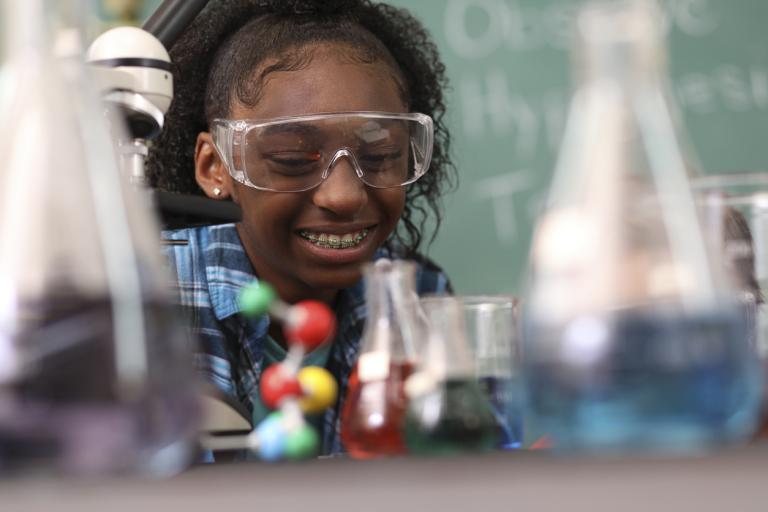What makes gifted students exceptional? It’s not always a higher intelligence or faster problem-solving. Often, children in gifted learning programs are there because they think differently. Some can see three-dimensional shapes unfold in their minds, so they excel at geometry. Alternatively, they have an unusual approach to words which becomes a talent for writing. “Gifted” children aren’t always numerically better than their peers, but something about their thought process gives them a gift in one or more subjects. From there, it’s not hard to see why Twice-Exceptional students (2e) are common in today’s schools. A Twice-Exceptional student is a child who has both a gift and a learning disability – often related to similar causes, but not always. For example, the child with geometric skill might also be dyslexic because their mind rearranges the letter.
What Is a Twice-Exceptional Student?
2e students come from all learning paths. Some quickly identify as geniuses when they are young and later reveal slower development in social and emotional skills – or in specific types of learning. Often, 2e children are first identified as disabled but later reveal their exceptional talents as they grow older, try new subjects, or gain the upper hand on their disabilities.
From a movie perspective, 2e students run the gamut between RainMan and Good Will Hunting.
We call them Twice-Exceptional because these students have two traits that make them unique from other students. Gifts and talents make a student exceptional, and the often-connected learning disabilities are another type of exception.
Unfortunately, not everyone understands the combined potential and challenges faced by 2e students. There are many myths and misunderstandings that we’d like to clear up here today.
Myth 1: Gifted Students Excel at Everything – Including Their Disabilities
When most of us were children, Gifted programs were seen as unidirectional. Children were either “above the fold” or they weren’t. Also, Gifts were seen as universal. Children who were “gifted and talented” should excel at math, language, history, and science all at once. This bias often slips over to 2e students with the assumption that they should “master” their learning differences as aptly as they tackle their favorite subject.
We know from working with real children that kids each struggle and excel in their own pattern. Being a great reader doesn’t automatically help a child deal with their emotions or break down fractions.
Myth 2: A Twice-Exceptional Student Cannot Lack Basic Skills
That’s above the fold’ bias also carries over into assumptions about basic skills. It’s often thought that a child is delayed or ahead, they cannot be both. This simply isn’t true. A child who excels at math may still struggle with other basic skills like tying their shoes or understanding facial expressions. 2e children struggle with normal aspects of life due to their learning and thinking differences that make them excel in specific subjects.
Myth 3: Gifted Students Are Mature for Their Age
Gifted children often seem precocious – mature and interactive for their age. However, this doesn’t make them fully more mature than their peers, or even at the assumed maturity level for their age. A child can have a favorite subject and converse deeply about it without grasping the subtleties of interpersonal relationships. Children can even read mature books and discuss them without achieving personal levels of maturity. In fact, many 2e students are behind specifically in emotional and social skills.
Myth 4: Addressing Disabilities Is More Important Than Nurturing Gifts
The other side of the common bias is over-emphasizing the disabilities of 2e students. They prioritize disability-care and separate 2e students into a babysat group of children with challenging disabilities. However, don’t cut off a Twice-Exceptional student from advanced learning opportunities. Nurturing their gift is their best chance to excel beyond their learning differences, and pursuing their gifts is often the best motivation to overcome personal challenges.
Myth 5: Gifted and AP Classes Can’t Support Children With Learning Differences
Finally, there is the ‘sanctity’ of the AP classroom. Veterans of AP programs know that the pressure put on the students to excel – sometimes with crippling amounts of homework. The high-pressure, fast-paced approach is uniquely hostile to 2e students who might need accommodation in the classroom, but it doesn’t have to be. AP and Gifted courses can support children with learning differences, often because the accommodations are not disruptive. Doing this may also cause us to take a closer look at our current AP and gifted students and the consideration their unique gifts have been shown.
Learn More About the Twice-Exceptional Student
Here at the Tenney School, we prioritize the unique learning needs of every student. Our one-to-one teaching style explores both the talents and weaknesses of each student to optimize their learning experience. 2e students will find a program designed to nurture their gifts and overcome their challenges, along with peers who are accustomed to each friend having their own learning style. To find out more about the Tenney School’s approach for 2e students, contact us today!


